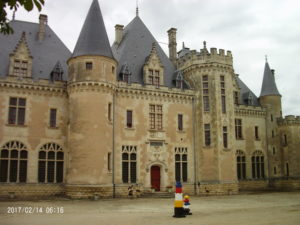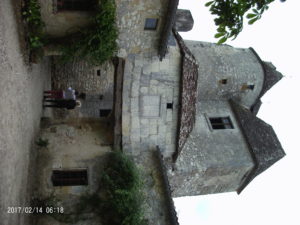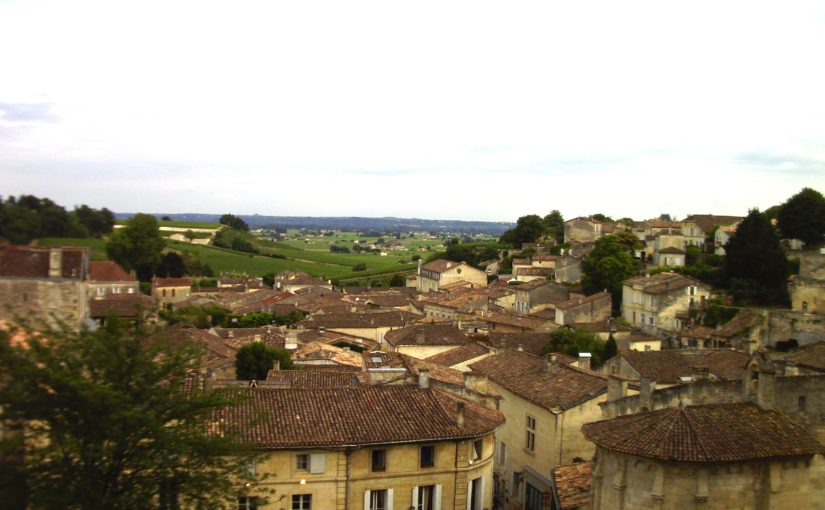In every French class I’ve ever taken, no matter the professor or subject, we have discussed cultural stereotypes. My classes at Tours have been no exception. The professors here often contest the stereotypes that students hold about French culture, but there is one stereotype that invariably elicits a verbal sign of agreement (“ça, c’est vrai, ça”) from the professors: the notion that the French love their food, leur nourriture, in particular their bread, their cheese, and their wine. It is in this French spirit that I voyaged last weekend to the vineyards of Bordeaux to discover a different part of France, the famous home of arguably the best wine in the world.
The trip to the vineyards was in truth a happy accident. Some friends and I were first motivated to visit the Château of Michel de Montaigne, the estate of the sixteenth-century man-of-letters who was one of the progenitors of the Enlightenment. The best book on Montaigne, to my knowledge, has fittingly been written by a Frenchman, the political philosopher Pierre Manent. In “La Vie Sans Loi” (Life Without Law), Manent has gone farther than anyone in establishing the political significance of Montaigne’s thought. As students of political philosophy, we were therefore excited to discover the place where Montaigne had been born, worked, and died. It was a pleasant surprise to discover that the Château was located in the heart of France’s wine country and that Montaigne’s estate had contributed to establishing the region’s reputation in the first place.

Upon arriving at the estate, I was pleased to discover that I could carry a conversation with the charming French girls working the register, only to discover just as quickly that my confidence was misplaced. I first paid for myself. One of my friends had lost his wallet, and I then asked if I could pay for him next. One of the girls said something to the effect of: “Oui, si vous-avez assez bien de monnaie?” I heard the phrase “de monnaie,” and must have smirked a little bit when I responded, “Oui, j’ai de monnaie,” because the girl spoke English a few moments later to clarify that she was not asking if I had enough money to pay, but if I had exact change. She was worried that my poor comprehension had left the impresion that she was rudely asking if I could afford the second ticket. We all shared a laugh, as I became the one who was left embarassed and apologizing.
This episode illustrates well the difficulty of transferring knowledge of a language from the classroom to life. At some point I had learned this phrase in one class or another, but this knowledge escaped me when I encountered it in the world. And yet this painful lesson also illustrates the benefits of studying a language abroad, mistakes and all, as I can promise you that I will never forget the meaning of the phrase “de monnaie” as long as I live.

The château itself was impressive, even if less grand than I had imagined. After departing from the estate, we journeyed to the small town of Saint Émilien to have dinner and spend the night. When deciding upon Saint Émilien, we had no idea that it was one of the most renowned small wine towns in France. This second happy accident allowed us to sample wine in an underground wine cave and learn a little bit about the strict labeling procedure that accompanies all wines in Bordeaux. Only vineyards growing certain grapes of a certain quality are allowed to label their wines with the local branding. For example, not all wines made of grapes from St. Émilien can be labeled as a vintage of St. Émilien. If you are fortunate enough to drink a bottle with the St. Émilien label, you know you’re experiencing the real deal.
The young worker who explained this procedure to us himself represented an important cultural insight. One of my friends asked him what he studied, and he said simply, “le vin.” The production of wine is a serious field of study in France. I have since learned, thanks to a professor at the institute, that this study even has a proper name: L’œnologie. The first line of the French Wikipedia page informs us that “L’œnologie est la science qui a pour objet l’étude et la connaissance du vin,” or in other words, that it is the science of the study and knowledge of wine. It encompasses everything from how to grow the best grapes, to the best methods of fermentation, to the best food with which to serve a specific vintage. The extent to which this study is a competitive and highly esteemed profession has no analogue in the United States. For while I am certain that there are serious people in California studying the production of wine, I am equally certain that no one looks upon them as cultural heroes.
